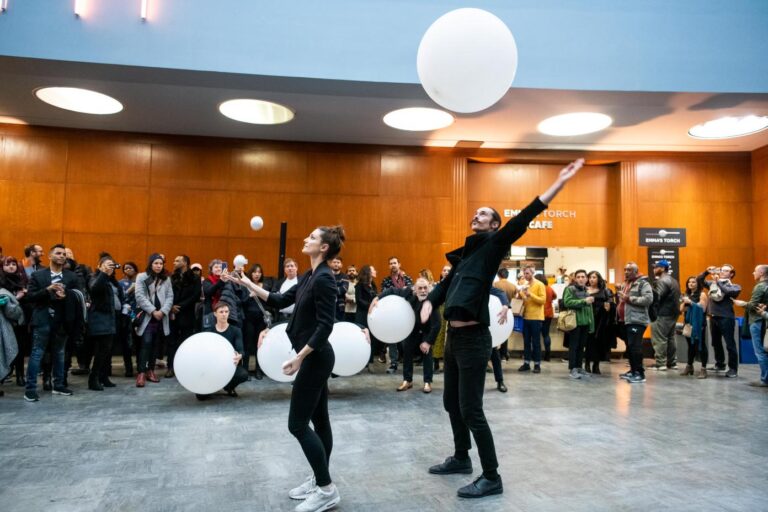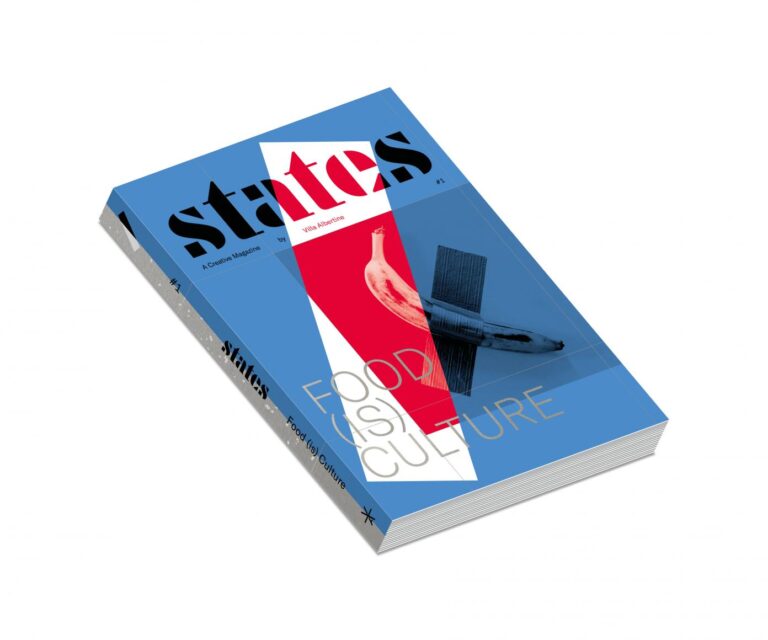
Sélène Saint-Aimé
Musician, composer, poet
April 4 - June 25, 2022
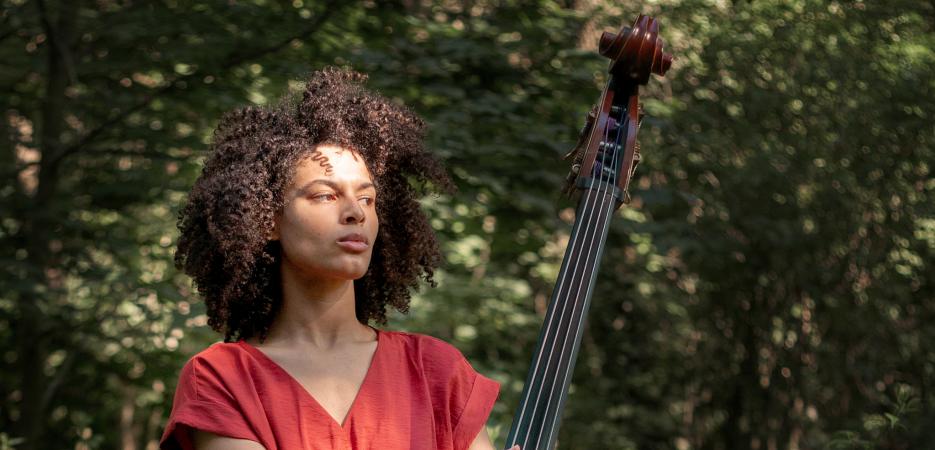
Nikola Cindric
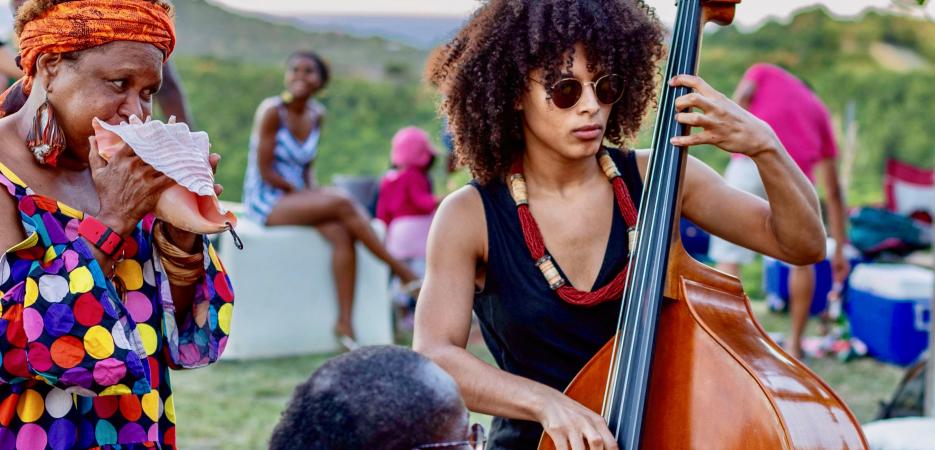
Serp de Madinina
- Music
- New Orleans
“My personal journey and musical identity are shaped by my exploration of the traditions of my Afro-descendant ancestors.”
My name is Sélène Saint-Aimé. I am a double bassist, singer, composer, and poet of Martinican and Franco-Ivorian origin. I was raised in a village on the outskirts of the Fontainebleau Forest. I discovered music at the nearby Django Reinhardt Festival in Samois-sur-Seine, where I became a volunteer so that I could attend concerts. One thing was for sure–when the time was ripe, I would become a musician.
I embarked on my music education quite late, when I was about 18. After several years of studying at music school and at the conservatory, I met Steve Coleman at a master class on the outskirts of Paris. I was highly impressed by his very spontaneous approach to music, rooted in a tradition I knew little about. A few weeks later, I decided to go to the United States to learn more.
I am lucky enough to have met some outstanding professors and mentors, including Lonnie Plaxico, Ron Carter, and the aforementioned Steve Coleman, thanks to whom I have been able to participate in many residencies and workshops in New York City, Chicago, Detroit, Los Angeles, Cuba, Paris, etc.
In 2019, I recorded my first album, Mare Undarum (“Sea of Waves”), at the invitation of the Komos label. In Greek mythology, Selene is the goddess of the full moon. Fascinated by the beauty and poetry of this natural satellite, I am inspired by selenography (the study of the surface and physical features of the moon) in my compositions.
The music I compose is also largely influenced by my Caribbean and African roots. Indeed, my personal journey and musical identity are shaped by my exploration of the traditions of my Afro-descendant ancestors. Continuing this research in New Orleans will be the beginning of a new chapter in my life: learning more about the past to better understand the present.
Sélène Saint-Aimé is a double bass player, singer and composer of Caribbean and West African origins. She has studied with internationally acclaimed musicians, such as Steve Coleman, Lonnie Plaxico, and Ron Carter. At the invitation of the Komos label, she recorded her first album, Mare Undarum, where she explores the world of lunar seas, as she would in an autobiography. In 2021, she won a “Victoire du Jazz” award in the “Rising Star” category.
My residency, entitled “Éritaj: New Orleans, Caribbean, and African American Music,” will be a formative experience in the heart of New Orleans (NOLA).
History
The first step will be to explore the musical history of the city to learn about its heritage. I will conduct research on New Orleans’ African, Afro-Indian, and Caribbean cultures, meet with historians, delve into the archives of the Jazz Museum and gather information from all available sources.
Drums and dance
The drum, an object of resistance, is a way of connecting with ancestry. I’m particularly fond of traditional music from Martinique, Cuba, Guadeloupe, Haïti, but also East Africa and West Africa.
In the course of my research, I discovered the “Djouba,” a dance that originates from New Orleans. “Djouba” is also the name for “Bèlè,” the traditional instrument and dance of Martinique.
Musical exploration
Since the beginning of my music education, I have placed great emphasis on studying the language of the Afro-American tradition, and this has involved listening to, transcribing, and meeting those actively involved in this music. I would like to write and record pieces for brass bands or other ensembles; that is why NOLA is the ideal place for me.
French West Indies
I would like to share the cultures of Martinique and Guadeloupe, and invite people to explore their drums, rhythms, and dances.
The residency will be based mainly in New Orleans. However, I do not rule out the possibility of travelling to other cities. In any case, NOLA is the ideal place to explore the roots of the African-American musical tradition and its links with the Caribbean and Africa. There are many musicians and composers I would like to talk to, in order to learn, and to set up musical sessions that embrace new concepts, especially with local visual artists. I would also like to organize various musical activities (in schools, music schools, and prisons, for instance).
My aim is to share and spread Caribbean and French cultures through my musical approach and to foster cultural and social connections between New Orleans and the Caribbean.
In partnership with
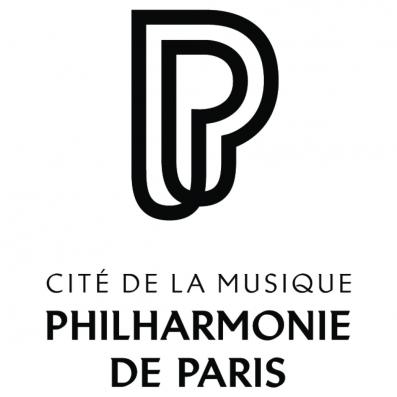
Cité de la musique – Philharmonie de Paris
Located in the heart of the Parc de la Villette in northeastern Paris, the Cité de la Musique – Philharmonie de Paris is a unique musical complex that attracts nearly 1.5 million visitors each year.
It offers an ambitious and eclectic program (450 concerts and 2 to 3 temporary exhibitions per year), while fully embracing its social and societal role. The institution aims to make its programming accessible to all audiences, regardless of age, social background, or geographical origin. It also strives to make gender equality, diversity, and eco-responsibility integral parts of its mission. In this spirit, it created the Maestra Conducting Competition with the Paris Mozart Orchestra and develops numerous initiatives across the country in partnership with local communities, such as the Démos children’s orchestra project. The Philharmonie also leads international cooperation and partnership projects with cultural institutions in countries such as the United States, Brazil, Gulf states, and various European nations.
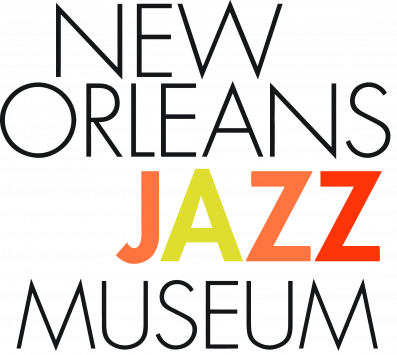
New Orleans Jazz Museum
The New Orleans Jazz Museum celebrates the history of jazz through interactive exhibits, educational programming, research facilities, and performances. The Jazz Museum enhances New Orleans’ ongoing cultural renaissance by providing resources for musicians and music lovers of all nationalities to explore America’s quintessential musical art form in the city where jazz was born.
Related content


Night of Ideas 2022: Patti Smith, Andre Dickens, Leïla Slimani, Joe Baker Join 250+ Artists and Cultural Visionaries in Marathon of Public Programs and Performances Across 19 US Cities
